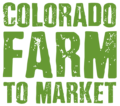Find out if you are covered by the FDA’s Food Safety Modernization Act (FSMA) Produce Safety Rule at www.coproducesafety.org.
Definition: Although the botanical definition of a berry is a fleshy fruit produced from a single ovary, a wide variety of fruits grown in Colorado are referred to as berries, including strawberries, blueberries, raspberries, and blackberries.
Harvest/Post Harvest: Precooling (rapid removal of field heat) is essential within 1-2 hours of harvest. Optimum storage conditions for strawberries (7-10 days), blueberries (2-4 weeks), raspberries and blackberries (2-5 days) are 32-36°F (0-2°C) and 90-95% relative humidity. In general, storage-life is very dependent on the handling of the berries during and after harvest. For best results, keep your berries dry in storage, wash right before using, and consume as soon as possible after purchase. It’s also important to handle them gently when rinsing.
Food Safety: Cyclosporiasis has often been associated with fresh raspberries imported into the United States, resulting in foodborne illness outbreaks. To avoid contamination of fresh berries, always wash your hands when picking, packing, or handling berries. Wash berries with clean, cool water just prior to eating. For offering berry samples, please see Farmers’ Market Vendor Guide for Preparing and Offering Food Samples.
Good Agricultural Practices (GAPs): Following Good Agricultural Practices can help reduce the potential for a foodborne outbreak to occur on the farm.
Distribution Method | Collapse All)
You are selling your product at a farmers’ market, CSA, roadside stand, or other direct to consumer outlet
If you are selling berries that you have purchased directly from a Colorado grower or from a wholesaler, you will need a Farm Product Dealers License.
Labeling: No specific labeling requirements. Unpackaged, single ingredient foods like fruits and vegetables do not need labels.
Sales Tax Liability: General sales tax information.
Weights and Measures: If you are selling your product by weight, you must follow the Colorado weights and measures requirements. Berries might also be sold by volume, refer to the fruits and vegetables section of weights and measures for guidelines.
You are selling your product to a store, restaurant, food cart, K-12 school, university, hospital, or other retail food establishment
If you are selling berries that you have purchased directly from a Colorado grower or from a wholesaler, you will need a Farm Product Dealers License.
Labeling: The state does not require specific labels, however your buyer might have specific requirements. Check with your buyer for product identification and traceability requirements.
Sales Tax Liability: General sales tax information.
Weights and Measures: If you are selling your product by weight, you must follow the Colorado weights and measures requirements. Berries might also be sold by volume, refer to the fruits and vegetables section of weights and measures for guidelines.
Value Added Products: Jams, jellies, dried fruit.
Related Links:
